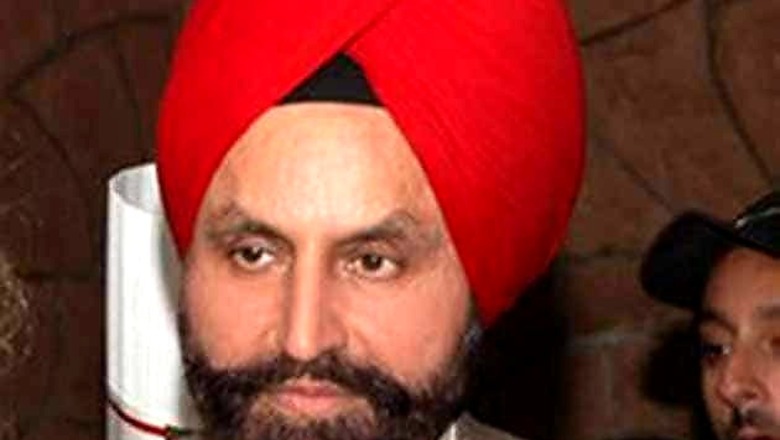
views
New York: Indian-American hotelier Sant Singh Chatwal on Thursday pleaded guilty at a court in US to violating federal election laws by using straw donors to secretly funnel money to political campaigns and will pay a million dollars to the US as part of his plea agreement.
"Chatwal admitted that he used straw donors to secretly funnel money to political campaigns so that he could gain access to the politicians, and he coerced another person to hide his crime," said acting US Assistant Attorney General David O'Neil.
Chatwal, 70, had raised at least USD 100,000 for former secretary of state Hillary Rodham Clinton's 2008 presidential campaign against Barack Obama. He pleaded guilty in the Eastern District of New York to conspiring to violate the Federal Election Campaign Act (the 'Election Act') by making more than USD 180,000 in federal campaign donations to three candidates through straw donors who were reimbursed and to witness tampering.
There is no allegation that the candidates participated in, or were aware of, Chatwal's scheme, federal prosecutors said.
As part of his plea agreement with the government, he agreed to forfeit one million dollars to the US. "Chatwal went to great lengths to undermine both election laws and our system of justice. Today's guilty plea shows our vigilance and determination to prosecute those who damage the integrity of elections by masking the true sources of campaign contributions," O'Neil said.
"Chatwal's scheme sought to subvert the very purpose of the Election Act. Chatwal then rolled the dice to stymie the government's investigation, thinking he could corruptly convince witnesses to his federal election crimes to stay
silent. That gamble did not pay off," said US Attorney Loretta Lynch.
The Washington Post said Chatwal faces a maximum of nearly six years in prison when he is sentenced on July 31. He is free on a USD 750,000 bond secured by property in Manhattan.
A spokesman for Chatwal said he "deeply regrets his actions and accepts full responsibility for the consequences." Chatwal was awarded Padma Bhushan in 2010 for his role in the historic India-US civilian nuclear deal. He heads the chain of the upscale Hampshire Hotels.
Lynch said Chatwal's scheme sought to subvert the very purpose of the Election Act. "Today's conviction sends a clear message that this office is committed to vigorously investigating and prosecuting individuals who are responsible for committing crimes in connection with federal campaign donations and witness tampering," Lynch said.
"Attempting to buy elections through illegal campaign contributions is unacceptable. It is also illegal," said FBI Assistant Director in Charge George Venizelos.
Internal Revenue Service's Chief Richard Weber said Chatwal admitted his actions were designed to circumvent the Election Act. The evidence against Chatwal includes an October 2010 recorded conversation between Chatwal and a business associate who became an informant, in which Chatwal underscored his view as to the importance of political campaign contributions, stating that without campaign contributions, "nobody will even talk to you. That's the only way to buy them, get into the system. What, what else is there? That is the only thing."
According to court filings, Chatwal sought to obstruct the grand jury investigation into his Election Act scheme by tampering with a witness, a person whose business performed construction work for Chatwal and Chatwal's companies and who had recruited straw donors at Chatwal's direction.
In a June 2012 recorded conversation, Chatwal told the individual that if FBI and IRS agents approached him or his family, they should not speak with the agents and should instead refer them to a lawyer Chatwal would provide.
During this conversation, the individual said that he would not tell agents that Chatwal gave him money to reimburse straw donors. Chatwal replied, "Never, never."
A few days later, in a July 2012 recorded conversation, Chatwal directed the same individual to lie to agents about the Election Act scheme. Chatwal said he would pay for the individual's legal fees in connection with the investigation and offered to conceal the money within a payment for work the individual's company had performed for Chatwal.
During the conversation, they discussed that investigators were seeking copies of campaign checks in the individual's possession, and they then discussed that it was helpful that some of the straw donors had been reimbursed with cash.
Chatwal added, "Cash has no proof". The Election Act limits the amount and source of money that can be contributed to a federal candidate or to an
individual candidate s political campaign committee and multi-candidate political campaign committees, commonly referred to as "political action committees".
In 2008, the Election Act limited primary and general election campaign contributions in a calendar year to USD 2,300 per campaign, for a total of USD 4,600, from any one individual to any one candidate. In 2010, the Election Act limited primary and general election campaign contributions in a calendar year to USD 2,400 per campaign, for a total of $4,800, from any one individual to any one candidate.
The Election Act also prohibits making a campaign contribution in the name of another person, including giving funds to a "straw donor," or a conduit, for the purpose of having the straw donor pass the funds to a federal candidate as the straw donor s own contribution.













Comments
0 comment